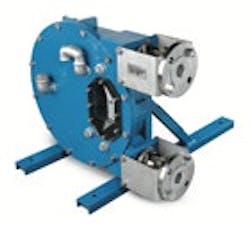Blackmer Announces Abaque Series Features
Blackmer, a provider of positive displacement pumps and compressor technologies and an operating company within Dover Corp.’s Pump Solutions Group, announced that its Abaque Series of peristaltic hose pumps have been designed to handle abrasive, aggressive, shear-sensitive and viscous materials in municipal and industrial wastewater treatment applications.
The Abaque Series pump is constructed with ductile iron and steel materials, allowing higher discharge pressures to 217.5 psi (15 bar), the company said. Its seal-free design aims to eliminate leaks, contamination and product loss while reducing maintenance and repairs. Three different types of hoses are available for use in the Abaque Series pump: natural rubber (generally resistant to diluted acids and alcohols), Buna or NBR (wear resistant to oily products), and EPDM (high chemical resistance, especially with concentrated acids, alcohols and ketones).
Available in nine different sizes, ranging from flow rates of .07 to 237 gpm (15 to 54,000 L/h), the Abaque Series pump is self-priming to 29.5 ft (9 m) manometric lift. The pump is also designed to run dry continuously without detrimental effects, handle a high concentration of solids and it is capable of running in forward or reverse.
Source: Blackmer
